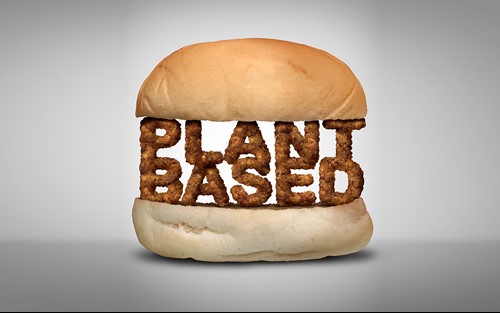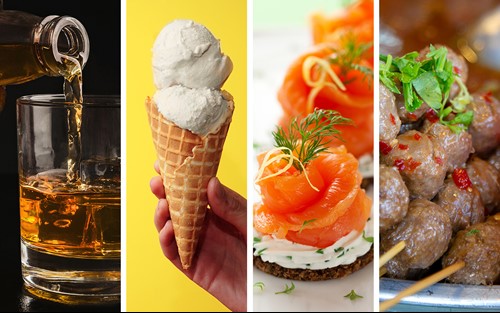Food made from, quite literally, thin air
There’s a lot of hype surrounding the Impossible Burger™, and rightfully so. It’s a new plant-based hamburger that’s supposed to look and taste like ground beef. Surprising concept, right? C.O.nxt heartily agrees that products like this are changing the industry.

In addition to artificial meat, there are a plethora of food products being created and grown in labs. From molecular whiskey to flora-based dairy and even cell-based seafood, the market for synthetic and cellular foods is on the rise. So, what does this mean for the ag and food industry? Here are answers to some burning questions you might have about this emerging segment.
What is all this artificial food jargon?
It’s hard to keep up with new food technologies and terminologies in the cellular agriculture space. So, let’s start with simple definitions.
Synthetic food is created from substances that are chemically synthesized into edible products. Scientists in labs create food from proteins, carbohydrates, fats, vitamins, trace elements, cells and even air. You name it, they’ve probably found a way to make food from it.
And we aren’t kidding when we say food made from air. One company, Solar Foods, creates its revolutionary natural protein, Solein, using only CO2, water and electricity. They claim the product is an unlimited source of protein free from the limitations of the agriculture industry.
Cellular agriculture is also on the rise. This technology harvests cells from animals and plants to create products like food, clothing and leather. In fact, the cellular agriculture community has even coined the term “neomnivore” for those who solely consume cellular agriculture products.
Why the sudden change of heart?
Synthetic and cellular-based foods are emerging in response to consumer demands. Some consumers want to know the food they eat is produced ethically and sustainably, hence the birth of foods created in labs like non-meat protein.
According to the Center for Food Integrity, only one in four consumers believe livestock animals are well taken care of, which has driven demand for synthetic- and cellular-based foods specifically in the non-meat protein sector. Others support these technologies to improve food transparency and the overall state of the environment. So, it’s a toss-up between consumer values and ethics, and synthetic foods have found a way to meet consumers in the middle.
Are these foods ethical or safe?
While some consumers are intrigued by the wow factor of synthetic or cellular foods, others are concerned about nutrition and safety.
Some argue that these products are not real food. They worry about the addition of synthetic chemicals, heavy metals, food dyes and artificial preservatives.
Food laws and regulations could influence market integration of synthetically and cellularly produced foods. There is no consensus on whether these foods are ethical, but companies continue to create new products to meet consumer desires.

Imagine food production without farming
Is it possible to produce an ample food supply without agriculture? With a food system industry that’s so interconnected and reliant on each moving part, it’s difficult to imagine a world without traditional agricultural practices.
For example, lab-grown or synthetic meat eliminates production of livestock manure that’s valued as fertilizer for crops. Without manure, many farmers would suffer yield and revenue loss, or would have to turn to more costly and less sustainable fertilizer alternatives.
Although these foods provide diversified options for consumers, the markets are niche. Synthetic and cellular food trends may continue to grow to meet demands, or they may regress with consumer backlash. Only time will tell. At the end of the day, those leading these efforts are providing more choices while capitalizing on fascinating technologies.
BONUS! A fun list of sciencey foods:
- Glyph: It’s molecular whiskey made from plants and yeast. Traditional whiskey is also made from plants and, more specifically, fermented grains. But Glyph has a different kick. Rather than distilling and aging their product, the creators of Glyph source molecules to craft a beverage biochemically equivalent to the finest aged whiskey. Read more about it here.
- Perfect Day: Maybe you’ve tried imitation dairy products like almond or coconut milk. But you probably haven’t tried milk made from dairy flora. Perfect Day extracts the tiny flora organism from milk and combines it with plant sugar to ferment and create animal-free dairy. They’re scooping up the market on dairy-free milk, cheese, yogurt and ice cream. Check them out here.
- BlueNalu: With the global demand for seafood at an all-time high, BlueNalu produces real seafood products from fish cells. Could this technology be the future for sustainable seafood? See how BlueNalu is leading cellular aquaculture here.
- Memphis Meats: Meat made from, well, not meat. Rather, it’s made from animal cells that grow into meat in a lab. Memphis Meats says they conserve animals, land, water and energy, all while producing dramatically less greenhouse gas emissions and a more sustainable meat industry. Learn more about Memphis Meats here.
Want to know more about lab-grown food? Get updated when new articles or webinars drop by signing up for our newsletter.
C.O.nxt Insight.
Our team of subject matter experts focuses on food and agriculture—farm field to processing to entrée on a plate. We can help you build a new brand, protect an old one or target customers to foster sales. Let’s talk when the time is right to handle your next strategic marketing and communications challenge: Marcy Tessmann, marcy@co-nxt.com.
SHARE THIS STORY
C.O.nxt Promotes Two Employee-Owners to Account Supervisors
HARTLAND, Wis. (April 15, 2024)—C.O.nxt, 100% employee-owned communications agency, announces two recent promotions on their team of employee-owners. Brandon Maly and Cheryl DeShambo have both been promoted to the role of account supervisor. Brandon Maly